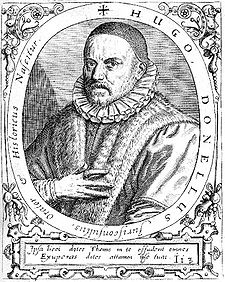- Hugues Doneau
-
Hugues Doneau
(Hugo Donellus)
Hugues DoneauBorn 1527
Chalon-sur-SaôneDied 1591
Altdorf bei NürnbergResidence France, Switzerland, The Netherlands, Bavaria Nationality French Fields Civil law Institutions University of Bourges, University of Leiden, University of Altdorf Known for Systematic analysis of the Corpus Juris Civilis Hugues Doneau, commonly referred also by the Latin form Hugo Donellus (23 December 1527, Chalon-sur-Saône – 4 May 1591, Altdorf bei Nürnberg), was a French law professor and one of the leading representatives of French legal humanism (mos Gallicus).
Life and works
Doneau, who was born into a well-respected family, studied law in Toulouse and Bourges. Bourges was then a center of legal humanism and François Douaren (Franciscus Duarenus), one of the most famous members of this movement was among Doneau's teachers at Bourges. In 1551, Doneau received a doctorate from the university of Bourges and began teaching there. However, because of his Calvinist confession, Doneau had to flee to Geneva after the St. Bartholomew's Day massacre in 1572. Doneau accepted a call from Elector Palatine Frederick III to a professorship at Heidelberg. In 1573, though, Doneau had to flee again, because Heidelberg and the surrounding Palatinate were converted to the Lutheran confession by Frederick's successor Louis VI. Doneau then continued to teach at Leiden, but in 1587, the political circumstances forced him into exile for the third time: Doneau had to leave Leiden in 1588, because of his sympathies for Robert Dudley, 1st Earl of Leicester. Doneau returned to Germany and became professor of law at the University of Altdorf (the university of the Free Imperial City of Nuremberg). He died in Altdorf in 1591.
Doneau was one of the French jurists who followed the example of Andrea Alciato (Andreas Alciatus) and applied the methods of Renaissance humanism to law. However, while many of the followers of this so called mos Gallicus (French method) concentrated on a critical evaluation of the texts in the Corpus Iuris Civilis, Doneau was more interested in the construction of a coherent system of law. His best known work Commentarii de iure civili (commentaries on the civil law) (in part edited posthumously by Scipione Gentili) is one of the first attempts to organise the subject matter of Roman law in a logical order rather than according to the sequence of the books and titles of the Digest. Doneau also made major contributions to various specialised areas of law such as the doctrine of possession and acquisition of ownership.
References
- K. Stapelfeldt, Jan Schröder: "Hugo Donellus", in: Gerd Kleinheyer, Jan Schröder (Eds.): Deutsche und Europäische Juristen aus neun Jahrhunderten. 4th ed. Heidelberg 1996, ISBN 3-8252-0578-9, pp. 112– 115
- Holthöfer, Ernst (2001). "Doneau, Hugues". In Michael Stolleis (ed.) (in German). Juristen: ein biographisches Lexikon; von der Antike bis zum 20. Jahrhundert (2nd edition ed.). München: Beck. p. 182. ISBN 3406 45957 9.
External links
- Opera Omnia, tomus 1 Complete works, volume 1
Categories:- 1527 births
- 1591 deaths
- French jurists
- University of Heidelberg faculty
- Leiden University faculty
- Roman law
Wikimedia Foundation. 2010.
